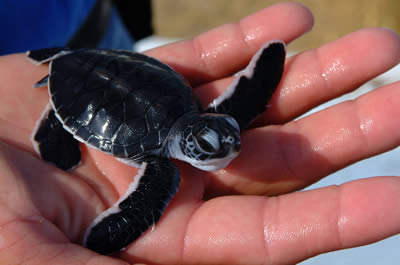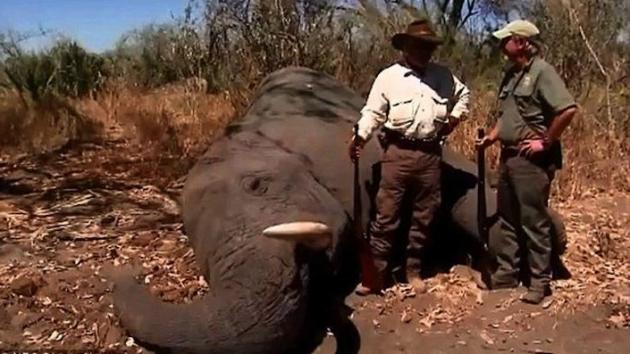Can a video of an elephant hunt teach us a greater story about conservation?
The Internet is on fire! Everyone is debating a new video where a lobbyist for the NRA hunts and shoots an elephant on TV. Tony Makris received a permit to hunt elephant in Botswana’s Okavango Delta and he brought a camera crew along to document the event. In light of the episode, some are calling for more bans on hunting the elephant. But is a blanket hunting ban really in the best interest for the species long-term survival? Or, would elephants stand a better shot at survival if their welfare is put into the hands of self-interested capitalists? Let’s take a look at the evidence.
The episode aired last Sunday night on the show “Under Wild Skies”, which was not produced by NBC, but an outside firm. In this case the firm was the NRA. Let’s take a look at the video.
NBC received such a flurry of criticism for airing the show that they’ve decided not to air the episode again. The broadcast company issued the following statement after the viewer backlash:
“We’ve listened to our viewers and will not air that particular episode ofUnder Wild Skies again. We’re also taking a close look at our internal standards as part of this process because this content should not have aired. While this form of hunting is legal, we understand that many viewers find it objectionable. As a result we are taking an aggressive approach towards objectionable content within future episodes of Under Wild Skies and other series.”
This poses an interesting question to those who are generally interested in the proliferation of wild animals such as the elephant or other species. Many times the initial reaction to a story like this is an emotional one, causing people to call for bans on hunting animals such as this. But can it be that if you allow more hunting and harvesting of these animals that they would be even more protected? Let’s take a case study from history for instance and examine whether or not this could be true.
Want to take species off the endangered list? Give them to capitalists!
 Sir Antony Fisher was an influential libertarian activist during the second half of the twentieth century. He founded the Institute of Economic Affairs and the Atlas Economic Research Foundation. (disclosure: This author was employed at Atlas for a period in 2009). In 1967, Fisher was looking for a business opportunity when one of his colleagues suggested the idea of a turtle farm. A National Geographic article had recently been published that described how the sea turtle was threatened by uncontrolled hunting and the loss of its nesting grounds.
Sir Antony Fisher was an influential libertarian activist during the second half of the twentieth century. He founded the Institute of Economic Affairs and the Atlas Economic Research Foundation. (disclosure: This author was employed at Atlas for a period in 2009). In 1967, Fisher was looking for a business opportunity when one of his colleagues suggested the idea of a turtle farm. A National Geographic article had recently been published that described how the sea turtle was threatened by uncontrolled hunting and the loss of its nesting grounds.
There was a growing demand at the time for turtle meat, soup and leather. Fisher believed that the Cayman Islands would be an excellent place to start a business due to the seagrass the turtles feed on growing there natively and the favorable tax environment. He honestly believed that the animals could be saved if they were domesticated, much in the same way pigs and sheep had been. He had a great point too, considering that only one out of the 100 to 1,000 eggs laid by a wild turtle would survive to adulthood. But if the turtle farm were successful, it would strengthen the creature’s chance of survival by reducing incentives to hunt it.
By 1973 Fisher’s farms were feeding over 100,000 turtles in 140 pens. Chefs made delicious turtle dishes for customers, with exotic-sounding names like Turtle Marengo, Turtle Gran Cayman and Turtle Scallopini. The leather from the turtles was exported to Japan to be made into shoes, belts and watch straps. The beautiful shells made wall decorations and light shades all over the world. But the conservationists grew jealous, and soon governments would step in to put on pressure to stop trafficking in turtles.
 In March of 1972, National Geographic author Dr. Archie Carr wrote that Fisher’s turtle farm was encouraging more demand, instead of rendering poaching unprofitable. He called for non-profits to take the place of the for-profit turtle farms that Antony Fisher had invested his fortunes in. The US Secretary of the Interior then proposed reclassifying the turtles as ‘endangered’, even though they were thriving on Fisher’s farm. If they were to institute the classification, it would have meant a 40% loss of exports to the United States. Coupled with a global oil crisis and with the government pressure from radical environmentalists, Fisher was forced to place his company into receivership.
In March of 1972, National Geographic author Dr. Archie Carr wrote that Fisher’s turtle farm was encouraging more demand, instead of rendering poaching unprofitable. He called for non-profits to take the place of the for-profit turtle farms that Antony Fisher had invested his fortunes in. The US Secretary of the Interior then proposed reclassifying the turtles as ‘endangered’, even though they were thriving on Fisher’s farm. If they were to institute the classification, it would have meant a 40% loss of exports to the United States. Coupled with a global oil crisis and with the government pressure from radical environmentalists, Fisher was forced to place his company into receivership.
Later one of Fisher’s son’s stated, “It was difficult to avoid the conclusion that the conservationists were jealous. They did not want 25 businessmen to succeed in doing something that they could not hope to achieve themselves: the conservation of the green sea turtle. The fact that we hoped to make profits seemed to enrage them.”
Ethics of the Hunt
So let’s look at this elephant hunt again, in perspective. Consider that elephant ivory from tusks is a very valuable commodity on the black market. The vast majority goes to china, where they use it in medicines and jewelry. The price of ivory in China can go as high as $1,000 a pound in Beijing. What would happen if elephants could be privately owned and commercialized? It would likely reduce poaching, due to the availability on the market of commercial elephant tusk. But if you were to place elephants on the endangered species list and bar them from being hunted, you’ll only increase the price fetched for tusk, thereby increasing the incentives for poaching.
The NRA hunt was totally controlled in a preserve, authorized by the local government and the money is used to fund broader conservation experts overall. So if the money is being used for conservation, then why are elephants on the decline? Perhaps it’s because the government has strict controls on elephant hunting and harvesting otherwise? It doesn’t matter now however, because the government has issued a ban on hunting that will come into force next year.
So what do you think? Should people be allowed to hunt animals like the elephant? Do you believe that if capitalists were allowed to domesticate wild animals that the population could increase? Leave your thoughts on the ethics of the hunt below.
addendum: Interested in learning more about Sir Antony Fisher? Atlas created a short biographical video I’ve shared with you here.





3 comments
What about the case of the carrier pigeon?
Time after time, we have seen animal rights proponents ‘love animals to extinction’ and animal resource management groups managed by sportsmen using modern techniques having large and healthy populations. As usual NBC cravenly caved, and this time the elephants will suffer even more than they do today.
… [Trackback]
[…] Find More to that Topic: thelibertarianrepublic.com/nra-lobbyist-shoots-elephant-tv-capitalism-conservation-video/ […]